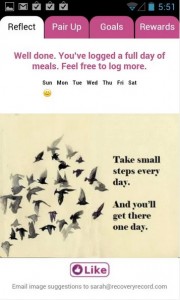 Recovery Record
Recovery Record
Launch, one of several startup sessions at the Health 2.0 event in Santa Clara, California this week, consisted of several three minute demos and pitches from recently or soon-to-be launched companies. This year, the pitches focused on addressing highly specific consumer pain points in healthcare, although exactly where those pain points were ran the gamut.
SmartPatient, not to be confused with Roni Zeiger's Smart Patients, is addressing the problem that hospitalized patients often don't feel their voice is heard, and hospitals use fairly old-fashioned methods to get patient feedback. The company is creating a mobile app and backend to get feedback from patients in near realtime, so they can report on their experiences as they have them. The app uses push notifications to ask a patient about a particular appointment or experience shortly after it happens. The company's offering also includes a back end that aggregates and analyzes that feedback to help hospitals make improvements.
MedVoy is an online referral platform for patients and providers. Doctors can sign up for the system to make it easier for their colleagues to refer patients to them. In return, the doctors have access to more patients as well as referral analytics -- seeing how many people refer to them and from where in the country. The platform also allows patients to transfer medical history and to schedule appointments online.
Genetrainer is looking to apply the lessons of mapping the human genome to fitness. The platform takes in gene data from 23andMe or another platform and uses peer-reviewed research data about genes that effect metabolism to generate a customized training plan. The platform will give users other health tips based on their genes including injury risk, sleep health, and diet.
Medlio plans to get its foot in the door as a virtual health insurance card, bringing cost transparency and insurance information to patients at the point of care, but founder Lori Mehen said it will do more. The app will store medical information as well as insurance information, making it easier to share medical forms with a new doctor.
InvolveCare is a new initiative out of Aetna's Healthagen business helping families stay connected to support and care for a loved one with a disease. Caregivers and those requiring care create a task list (like "Drive Dad to his appointment") and then family members can sign up to help with different tasks. The patient can also post pictures and sound files and other updates for the family to see.
Vimty is an online platform that supports seniors making end-of-life care decisions. Users go to an online portal and the software guides them through decisions about who their healthcare advocate is, what level of life-sustaining treatments they want, how they want to manage pain, how they want to manage emotional wellbeing, and where they want to die -- in a hospital, hospice, or at home. The system generates a document, and users can get it notarized over Skype. The Skype call is recorded, and a specially trained notary will make sure the users understand what they're signing.
Recovery Record is a mental health app for young people dealing with eating disorders. For the patient, the app is a specialized journal where they can record what they're eating, their mood and cravings, as well as thoughts and feelings. It can also deliver distraction tactics and other therapeutic tips in response to an urge to binge eat, for instance. All the data is shared with the mental health practitioner, who can glance at it before seeing a patient or look for trends in when and where symptoms occur in the patient's session.
Liviam, which is launching its beta in November, is a website to help families deal with the day-to-day logistical problems of hospital stays. As well as letting a family or individual update friends and family about their stay and condition, the site provides tools to schedule visits so everyone doesn't come at the same time and to request help with things like picking up mail, watering plants, or watching pets during extended hospital stays. Founder Josh Margulies plans to offer it as a branded product via providers, who will also be able to advertise their own classes and support groups within the site.
Mevoked is an internet use monitoring engine for parents, but one that uses natural language processing to flag "troubling" sites -- ones of a sexual or violent nature, for instance. It takes a big data approach to try to identify not just what objectionable sites a child is visiting, but how often and why.
OMsignal, which also presented at DC to VC, is manufacturing clothing embedded with various health sensors that could have a variety of use cases. The company is about to start a clinical trial with a "prestigious US-based care organization" according to Cofounder and CEO Stephane Marceau.

















